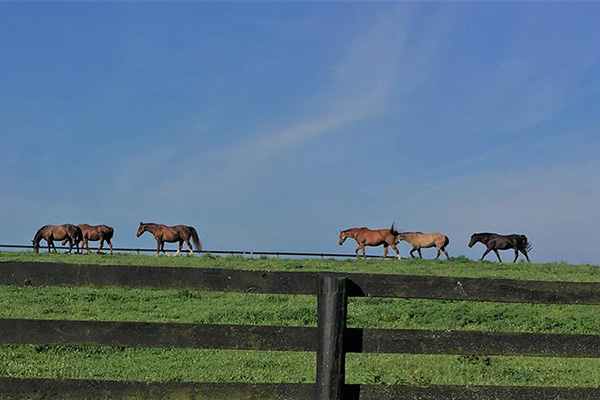UK Gluck Equine Research Center Launches National Survey on Horses Aged 15 Years and Older

UK researcher Amanda Adams’ geriatric horse herd grazes in a pasture at the University of Kentucky. Photo by Alisa Herbst, UK doctoral student.
By: Alisa Herbst
While horses aged 15 years and over make up a significant portion of the U.S. equine population, surprisingly little is currently known about their management and health status. In response, the University of Kentucky Gluck Equine Research Center is launching a survey to better understand the special needs of this age group.
Eligible survey participants should own one or more horses that currently reside(s) in the U.S. While the survey focuses on horses, including ponies, aged 15 years and older, owners of younger horses are also invited to participate in the survey. The survey takes between three and 25 minutes to complete. The survey can be accessed at https://uky.az1.qualtrics.com/jfe/form/SV_bxAeIRSVM6gAOvb, and will be available through Nov. 20. Participants will also have the option to enter a raffle to win two bags of BUCKEYETM Nutrition feed (1st prize), or four pounds of Reasons® Joint Support Treats (2nd and 3rd prizes).
The survey project is coordinated by Alisa Herbst, a doctoral candidate at the Gluck Center in the College of Agriculture, Food and Environment, who is concentrating on the aging process of horses. She is being supervised by assistant professor Amanda Adams, a specialist working with geriatric horses.
“The main goal of this survey is to create a management and health profile of U.S. horses aged 15-plus years,” she said. “By applying the insights that we gather from the survey, and other work in my PhD, I hope that we can provide improved support for those managing horses of this age group.”
Herbst is collaborating on this project with an international and national research team that includes Adams; Patricia Harris, professor, veterinarian and director of science at MARS Horsecare and head of the equine studies group at WALTHAM Petcare Science Institute; Michelle Coleman, veterinarian and assistant professor at Texas A & M University College of Veterinary Medicine and Biomedical Sciences; and Erica Macon, doctoral candidate at UK’s Gluck Center. MARS EquestrianTM is providing sponsorship for this study.
“We’re very excited about the information that this survey will provide. While much beloved by their owners, we still know very little about the specific needs of this population. I look forward to hearing more about the results from this survey, and I greatly appreciate the sponsorships provided by MARS Equestrian for this effort,” said David Horohov, chair of UK’s Department of Veterinary Science and director of the Gluck Center.
The contribution of every horse owner, and especially those with any horse or pony over 15 years of age, will be vital for the success of this project and the continued improvement in the health of horses.
About MARS Equestrian™
MARS Equestrian™ Sponsorship by Mars, Incorporated is the link between our iconic brands and the equestrian community. For generations, Mars has celebrated a rich equestrian heritage, and through purposeful partnerships, MARS Equestrian™ is committed to the sport and building an enduring legacy. From world-class competitions across all equestrian disciplines, to stewarding the power of horses on society and sustainability, MARS Equestrian™ is dedicated to our purpose to improve the lives of horses, pets, and the people who love them. Check out our website at www.marsequestrian.com and social media @marsequestrian.
About WALTHAM Petcare Science Institute
The WALTHAM Petcare Science Institute is Mars Petcare’s pet research center. Our work focuses on the nutritional and behavioral needs of pets, as well as preventive health. We use this knowledge to support development of innovative products and services, advancing science to deliver our Purpose: A BETTER WORLD FOR PETS™. The WALTHAM™ Equine Studies Group, which is headed by Professor Pat Harris, MA, PhD, VetMB, DipECVCN, MRCVS, is dedicated to advancing the science of horse nutrition and provides the scientific support for MARS Horsecare globally including the BUCKEYE™ Nutrition, SPILLERS™, and WINERGY™ brands. By collaborating with key research institutes and universities around the world its work remains at the forefront of equine nutritional science.










